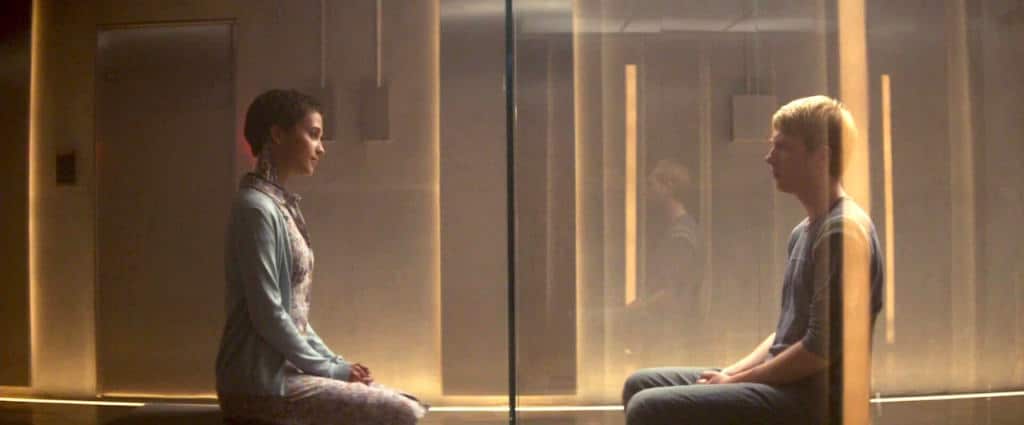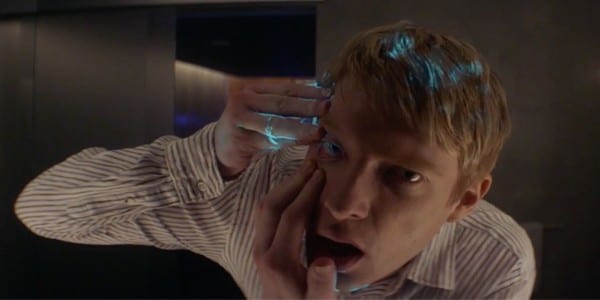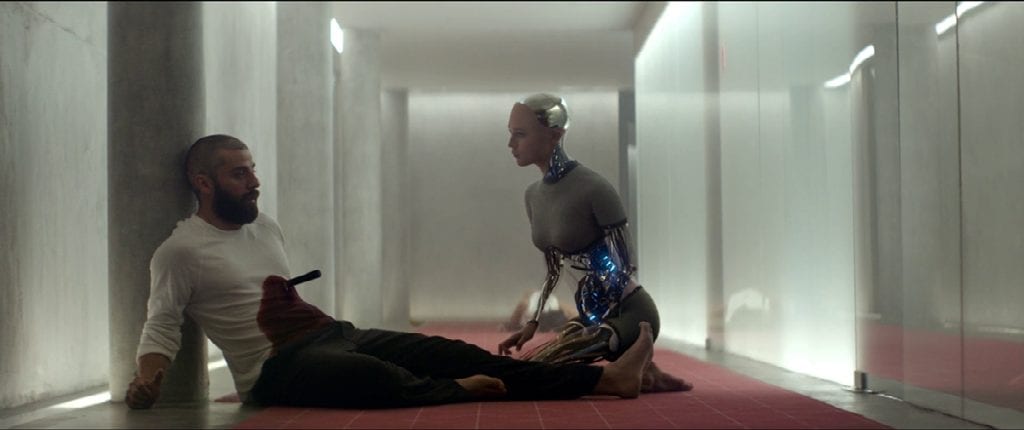What becomes readily apparent anytime you watch a piece created by Alex Garland is the stunning visuals. The talented auteur has a penchant for mesmerizing the audience with his use of innovative and oftentimes otherworldly aesthetics. He creates these beautiful futuristic worlds that look fantastical but feel cold, almost sterile, as if the emotion has been washed clean from the picturesque surroundings. Ex Machina is no different. It looks incredible, but the world has an empty feeling to it. It is strange the characters that feel the most distant, the most void of emotion are the human ones. Caleb and Nathan seem almost if not more mechanical in their nature than the machines themselves.
This is not a trait that is unique to this piece. Another of Garland’s creations, the TV series Devs shares a lot of the same genetic makeup as Ex Machina. They both feel like they share the same world, but at the same time reside in their own little corner. Not only do they share similar clinical futuristic aesthetics, but they also ask similar questions about creation, and how technological advancements will undoubtedly affect our idea of it. In Garland’s own words in an interview with The Hollywood Reporter:
I saw these two as companion pieces to each other. In one, you have a man who acts as if he’s god and creates something. In the other version, you have humans who create a god. One is man acting as a god and the other is the constructing of a god. It felt like twin states of what technology is making possible.
Nathan, like Forrest from Devs and so many other billionaires, seems to have become isolated in not just location but in how he perceives the world around him and those that inhabit it. He looks at people as tools to be used for his exploration of artificial intelligence, seeing them as nothing more than a means to an end. Nathan has become singular in his mindset, shedding all human decency. He has alienated himself from the world, which has given him a skewed sense of what is acceptable social behavior. He has gotten to the stage where he has created life, which means he sees himself as a deity looking down from on high.
There is a clear separation that he sees between himself and the rest of humanity. He brings Caleb to his home or research facility, as Nathan puts it, to use him as an unwitting pawn in Ava’s Turing Test. What becomes quickly apparent to Caleb and the audience is that Nathan is testing him every bit as much as he is testing Ava. Nathan is monitoring not just Ava’s responses and action, he is keeping an ever-watchful eye over every little movement Caleb makes. It is as if Nathan has created a maze and Caleb is the rat that is trying to navigate its way through, with some hope of a little bit of cheese on the other end.

It is in Caleb’s search for the proverbial cheese that Ex Machina sets itself apart from other movies that focus on artificial intelligence. Usually, the A.I. in question is just that, in question, but not in this piece—the A.I. that is contained within Ava is undeniable. What the real question is, is what motivates Ava’s actions—this is the crux of Ex Machina. What is Ava’s end goal? Is she just trying to find a connection in her small, cold world, where she is confined to a glass room, that amounts to nothing more than a cell, or is there some other motive behind her actions? This question doesn’t linger long, as we quickly realize that there is much more to Ava than meets the eye.
At first, we wonder if this is all one big mirage. Are we seeing what we want to see? Are we only imprinting emotions on Ava, or are they really present? Is this imprinting just an extension of the anthropomorphization we experience with animals? During her sessions with Caleb, we like him become aware of the depths of not just Ava’s intelligence but also her sentience. It is whilst conducting one of these sessions that there is a system failure. Caleb finds out that Ava’s the cause behind the facility-wide power outages. Now for the first time, he sees that everything is not what it seems and that he finds himself in a precarious position.
This revelation leaves Caleb in the same position as the audience, leaving us with a choice to make. Do we believe Ava or do we believe Nathan? Which tale that has been spun for us is the real version of events? Then as the story unfolds, the truth that does come to light is not so black and white, but more like a mosaic of different shades of grey. The answers to these complicated questions just lead to even more complex outcomes. This is what Caleb is constantly weighing up, this is why he is always at odds with himself.
He never knows if his thought stream has been planted there or is it of his own volition. The doubt in his ability to control his own consciousness even leads to Caleb self-harming in the search for some sign that he too may be a synthetic lifeform. This is the consequence of being put in the middle of two beings of higher intelligence. On one side Nathan is pulling his strings in one direction but on the other Ava is tugging on his heartstrings, putting him in the mindset she needs to manipulate him to do her bidding. In both mind and heart Caleb is being bombarded by Nathan and Ava.

This game of chess is so intricate and so fascinating, but just like any game, it is only as good as the players that are playing it. This is where the importance of Ex Machina’s small cast comes into play. What is even more important is how the small cast is utilized. When you have a contained story like this, it is so imperative that all of the cast is on point, there can be no weak links. Garland must have mulled over this decision for a long time because the cast is the backbone of making this narrative believable. Every single person was so integral in making the story work, each actor an important piece in this meticulously put together jigsaw puzzle.
Out of the excellent cast, the one that stands out is Alicia Vikander, who has to complete the unenviable task of not only being a person who has to play a believable A.I. but at the same time, she has to portray an A.I. that is trying to pass as a believable human. It is a very tricky balancing act that she pulls off to perfection. Vikander portrays Ava with such complexity, making you feel so much sympathy for her, but at the same time, she never lets you feel at ease. Ava is always contemplating, always learning, forever trying to figure out what buttons to press and when to press them. Vikander plays the audience like a fiddle in the same way Ava toys with Caleb.
Although Vikander is the one who steals the show, the other members of the cast do not disappoint either. Domhall Gleeson and Oscar Isaac are excellent in their battle of wits. The two actors play off each other seamlessly—the sociopathic mentor and his seemingly naive student. Issac’s Nathan is a willing teacher but only because he feels superior to Caleb, believing in his naivety, not realizing that he is always learning from him. Very much in the same way Ava tricks Caleb into a false sense of the security, Caleb does the same to Nathan. The dynamics that are shared between them mirror one another, not just in the way they interact with each other but also in the conclusion they come to—in both cases, the pupil outwits the teacher with grave consequences.

Aside from artificial intelligence, Ex Machina also focuses on the invasion of our personal data and how it can be used against us. Nathan built Ava to the exact specifications that were needed to manipulate Caleb, putting him in the position to be an unwitting accomplice to any of Ava’s potential escape plans. Ex Machina shows just how tech companies use this type of bespoke advertising to target the consumer, using the data they collate from us like some sort of digital window into our souls. This is ostensibly what Nathan is doing: he is selling Ava to Caleb by using his own wants and desires against him.
It is the whole reason that Caleb is there in the first place. It is because he fits a certain profile. To harken back to what I said earlier in this piece, Nathan views people as mere tools, and Caleb is the right tool for this job. Nathan sees nothing special about Caleb. It’s true that he is exceptionally smart, but he is there because he is seen to be pliable, easily molded for the task he was chosen to complete. This is what ultimately leads to Nathan’s downfall. It is his arrogance and hubris that prevent him from seeing that he too is being played until it is too late for him to change the course of events, which leads to his death, and Ava’s subsequent escape.
During her escape, Ava imprisons Caleb within the subterranean section of the facility. This is the culmination of her plans. It is also the culmination from everything she has learned from her interactions with Nathan and her sessions with Caleb. Now Ava will use everything that she herself has collated to go out into the wider world, the implications for which could have Earth-shattering ramifications. One could only imagine how an uninhibited, untethered artificial intelligence would affect the world, especially one so uniquely attuned to human behavior as Ava, not to mention the fact that she would be operating from the shadows.
Ava could have an untold effect on her surroundings and the people with whom she interacts. She is indistinguishable from you and me. Ava is the pinnacle of the technology of our times. With her creation Nathan did in a way become the deity he claimed to be, but the funny thing about gods is they are often destroyed by their creations, replaced and pushed aside as antiquated. This is something that has occurred throughout history. This is the question that we all ask ourselves when it comes to artificial intelligence. Will there come a time when it will think us obsolete? If that day is to transpire, what will it mean for us as a species moving forward?




